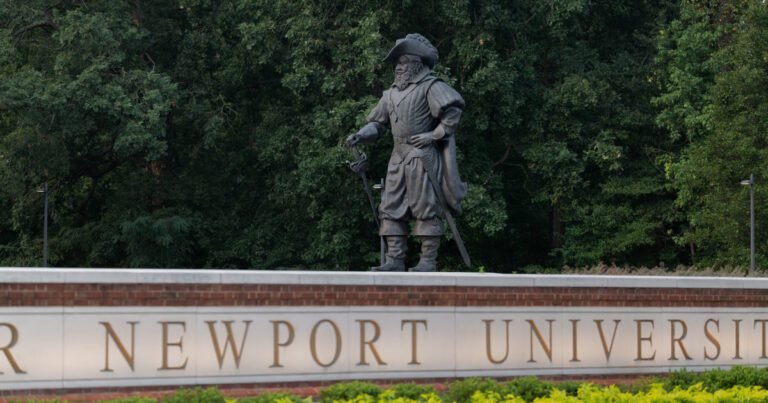This article was produced for ProPublica’s Local Reporting Network in partnership with WHRO’s Virginia Center for Investigative Reporting. Sign up for Dispatchs to get articles like this as soon as they’re published.
The Virginia General Assembly approved the creation of a statewide commission to investigate the role of public universities in displacing black communities.
This Congressional action marks a milestone for a budding national movement seeking compensation for families dispossessed by university expansion. This follows a 2023 series by ProPublica and the WHO’s Virginia Center for Investigative Reporting that highlighted how colleges across the country uprooted tens of thousands of families of color, led to Black land loss and delayed Black homeownership rates. It was shown that this is a contributing factor. The series details how the founding and expansion of Christopher Newport University in Newport News, Virginia, swallowed up black neighborhoods, and city and university leaders there He urged the establishment of a similar task force in April.
The state budget passed by the Legislature on Saturday determines whether Virginia’s public institutions of higher education have “purchased, expropriated, or otherwise appropriated” property in black neighborhoods to establish or expand campuses, as well as providing compensation. A committee will be set up to decide whether the amount will be paid. Be “appropriate” to the property owner or his or her descendants, according to the bill. The commission will also look into similar acquisitions in other states to provide context. The commission will report its findings to Congress annually and is expected to submit its final recommendations by July 2027. National higher education organizations said they were not aware of any other state-wide committees considering the issue.
The Virginia commission will include 10 members of Congress, two top state education officials, and seven members of the public. Gov. Glenn Youngkin has until April 17 to sign the budget. He also has the ability to veto certain items, such as the commission’s funding, which is $28,760 a year for commission expenses. Committee staff are paid separately by the State Department of Legislative Services.
“Our country has gone from violently uprooting Black communities to doing it legally,” Richmond pastor Robin D. Mines testified in support of the provision at a congressional hearing last month. “It is long past time to do something about this and bring hope to our community.”
The ProPublica-VCIJ series explores how universities address legacies of racial injustice both on campus and nationally by documenting the dispossession and destruction of Black neighborhoods in higher education facilities. further deepened. Even as red states, which say racism is entrenched in America’s laws and power structures, limit classroom discussions of critical race theory, many universities are grappling with history.
Rep. Delores Mackin, D-Richmond, introduced legislation to create the commission in January. McQueen originally proposed allocating $150,000 annually, but that amount was reduced in a conference committee process after her bill was included in the budget. She will request further funding if needed, she said.
McQueen, who will serve on the committee, said he would seek input from other legislators, historians and families affected by university expansion. She said the committee would work on “how to repair some of the damage that has been done through real funding, scholarships and other types of methods.”
He declined to speculate on whether the governor would veto the commission. In 2022, Youngkin, a Republican, will push for the use in K-12 schools of what he calls “inherently divisive concepts” such as critical race theory, which is commonly taught in college and graduate school. issued an executive order to stop it. In a statement Saturday after the Legislative Session adjourned, Yonkin said the Legislature “has sent us more than 1,000 bills and backbone budgets that require significant effort,” and that he will consider them within the next 30 days. He said he would make a decision.
Over the past two decades, prominent universities such as Harvard University, Yale University, Brown University, and the University of Virginia have published extensive criminal disclosures describing their historical involvement with the slave trade and slave owners. In Virginia, a 2021 law would allow UVA and four other schools founded before the Civil War to use slave labor to find descendants and pay reparations through scholarships and community-based economic development and commemoration programs. Mandatory for one university.
The 2020 protests over the killing of George Floyd prompted more institutions to reexamine their histories of racial injustice. Still, few universities are considering the impact that growth will have on communities of color. In 2022, the Colorado Legislature allocated $2 million in scholarships to families and descendants of Denver’s Auraria community. The establishment of the University of Colorado Denver campus in the early 1970s and subsequent growth forced 350 families to relocate and reduced the predominantly Hispanic neighborhood to just 13 cottages and a grocery store. Under this scholarship program, students and their families who lived in the area between 1955 and her 1973 will have fees and tuition waived.
In Athens, Georgia, former residents of the Linnentown neighborhood are seeking redress for the loss of their community to a prominent estate in the early 1960s to make way for University of Georgia dormitories. Researchers estimate that land foreclosures cost black families $5 million in current dollars, largely due to underpayments.
Commissioners in Athens-Clarke County, where the university is located, passed a resolution in 2021 asking the state to compensate about 50 displaced families and their descendants. He secured $2.5 million for them to build affordable housing and a community center. The University of Georgia rejected the concept of restitution, saying the state constitution prohibits voluntary public funding to third parties.
In response to the ProPublica-VCIJ series and accompanying documentary film, Virginia state legislators have begun discussing relief for uprooted families. Both documentaries investigated how Newport News’ all-white City Council gained prominent control over the heart of Shoe Lane and its surrounding thriving black community. In the early 1960s Christopher He built the Newport campus. City leaders wanted to “erase the black spot” near the segregated country club. In subsequent decades, the school acquired nearly all of the remaining housing.
Following the first article in the series, Christopher Newport University President William Kelly said in a message to faculty and staff that the university’s progress has been “founded on human sacrifice, and we have We need to continue to learn and understand.” Kelly, who took over as president last year, also said new students will be taught about the university’s origins and evolution during orientation. In January, the city of Newport News and CNU announced the creation of a task force to investigate decades of property acquisitions and consider possible relief for displaced families.
Christopher Newport University declined to comment to ProPublica or VCIJ about the possibility of a joint local task force or state commission.
Other Virginia State universities that have absorbed black communities are also trying to atone for their histories. With the expansion of Old Dominion University since the early 1960s, Norfolk’s once thriving black community called Lambert’s Point has shrunk. In the 1990s, the university established scholarship and employment programs for current neighborhood residents.
The monument on UVA’s campus acknowledges centuries of mistreatment of Black people during and after slavery, including employees and local residents. In 2020, UVA President Jim Ryan announced a goal to build as many as 1,500 affordable homes and apartments on property owned by the school and its affiliates. The residence will be open to residents outside the university community.
Task Force to Consider ‘Restorative Justice’ for Black Families Displaced by University of Virginia Expansion
Although Virginia’s bill focuses on public universities established by the state, private universities also have their own troubled history. The University of Richmond, for example, acknowledged in 2019 that part of its campus was built on enslaved people’s graves. The university plans to build a memorial to honor those buried there.
Mr. McQueen, the bill’s sponsor, said he had long been aware of the forced removal of black neighborhoods by universities, but the ProPublica and VCIJ series spurred him to take action. Several supporters of the proposal, including the heads of the NAACP’s statewide and Richmond chapters, attended the Feb. 9 subcommittee hearing in person and online.
Others submitted comments through the General Assembly portal. “I think she has an opportunity to right the wrongs of the past,” wrote the Richmond resident, who identified herself only as Antoine. He added that the “backlash” against studying the history of racial injustice, like the university’s expansion itself, “reminds us once again of cultural erasure.”
Lewis Hansen contributed reporting.

